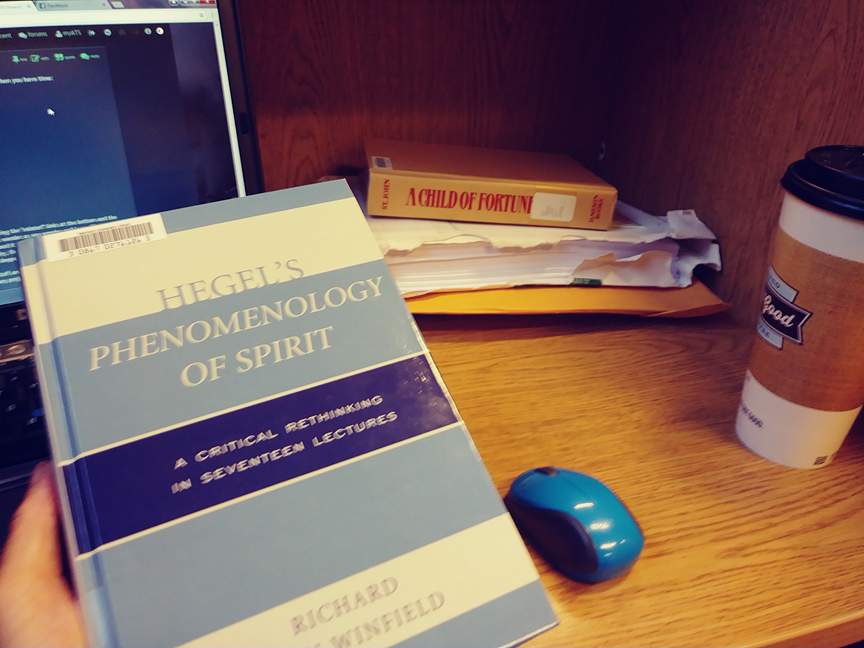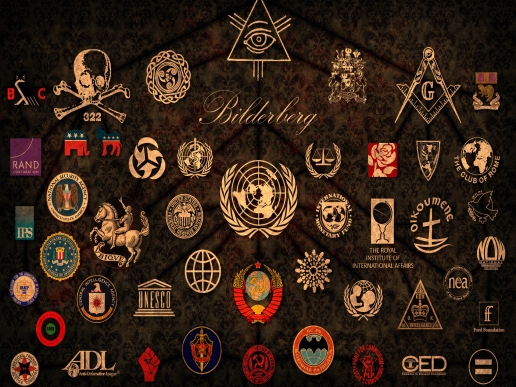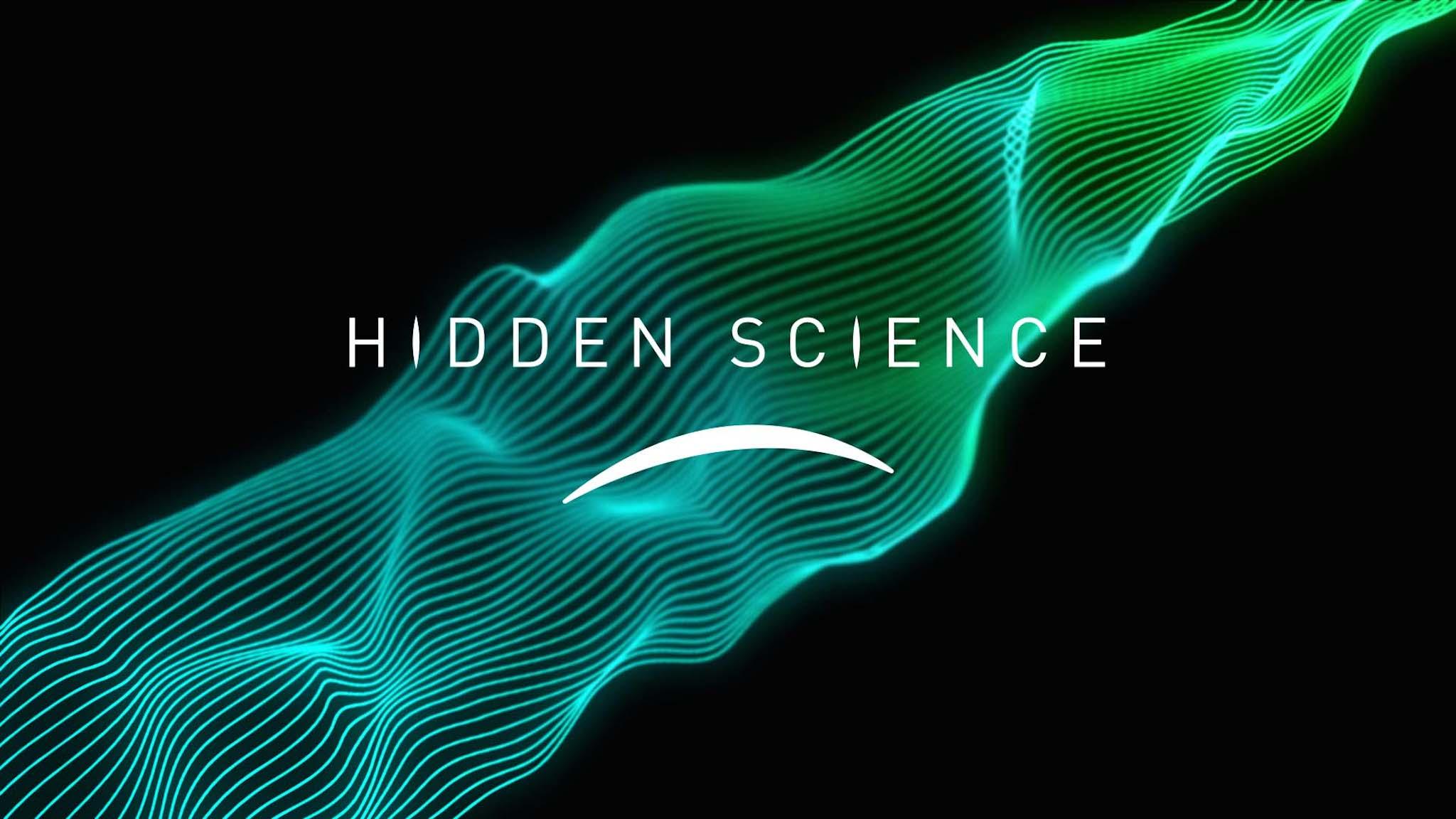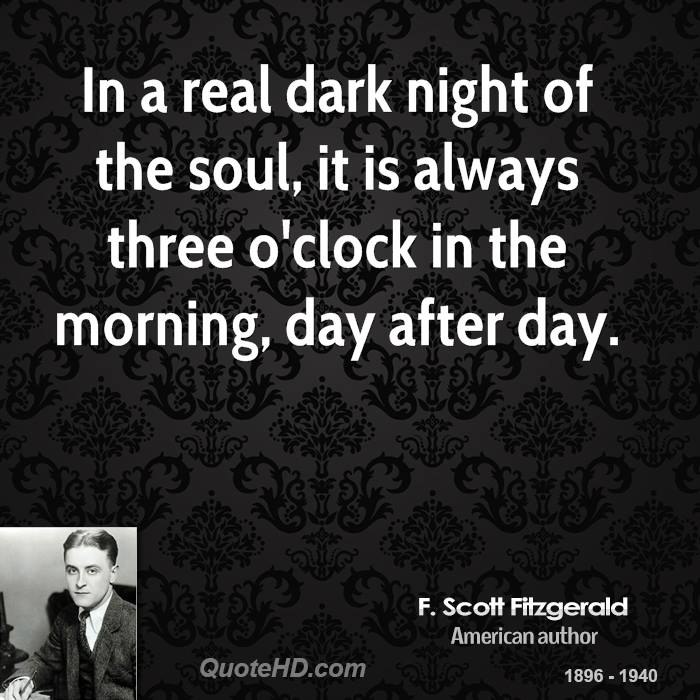It looks like you're using an Ad Blocker.
Please white-list or disable AboveTopSecret.com in your ad-blocking tool.
Thank you.
Some features of ATS will be disabled while you continue to use an ad-blocker.
share:
My current course of study ...

(yes that's me 5min ago lol)
GWF Hegel
Phenomenology of Spirit or Science of the Experience of Consciousness
The book is full of thousands of triads, hence the common attribution to this as the source of the "Hegelian Dialectic" of theses, antitheses, and syntheses.
Ok but here, to make it easier (if you want to investigate this groundbreaking work in the history of philosophy along with me) - this is a good web series and the prof does a decent job at digging into the work.

(yes that's me 5min ago lol)
GWF Hegel
Phenomenology of Spirit or Science of the Experience of Consciousness
Phenomenology was the basis of Hegel's later philosophy and marked a significant development in German idealism after Kant. Focusing on topics in metaphysics, epistemology, physics, ethics, history, religion, perception, consciousness, and political philosophy, The Phenomenology is where Hegel develops his concepts of dialectic (including the Master-slave dialectic), absolute idealism, ethical life, and Aufhebung. The book had a profound effect in Western philosophy, and "has been praised and blamed for the development of existentialism, communism, fascism, death of God theology, and historicist nihilism."[1]
The book is full of thousands of triads, hence the common attribution to this as the source of the "Hegelian Dialectic" of theses, antitheses, and syntheses.
Voegelin argued that Hegel should be understood not as a philosopher, but as a "sorcerer" -- i.e., as a mystic and Hermetic thinker.[77] This concept of Hegel as a Hermetic thinker was elaborated by Glenn Alexander Magee[78] who argued that interpreting Hegel's body of work as an expression of mysticism and Hermetic ideas leads to a more accurate understanding of Hegel.
Ok but here, to make it easier (if you want to investigate this groundbreaking work in the history of philosophy along with me) - this is a good web series and the prof does a decent job at digging into the work.
Hmmmm...
Hermetica
Hermeneutics
So of course it's about Hermes (as this whole thread sort of is), and Hermeneutics means in Greek "Interpretation, Translation" or even "Explanation".
And so it is also about a scientific examination and philosophical inquiry into the Divine Messages:
Hermeticism
Almost everyone goes insane when they have a Mystical Experience. When you open your Heart and Mind to the Divine, so much information floods in that it typically overwhelms and shortcircuits the average individual.
So I will aim to provide the tools necessary to survive such an experience, and even facilitate an increasing stream of them, without suffering any mental disorders or crashes as a side effect.
Spirituality is dangerous and so must be approached from an honest position, with weapons and armor such as scientific and academic methods, analysis, inquisition, deep research and fact checking to verify the veracity of those mystical revelations, and a focus on ethics, social dynamics, and morality in order to survive in a world of other people.
Almost every individual I've ever met (and I've met many thousands of people) that ever had powerful life changing mystical experiences (perhaps 10 to 20% of all people I've met?) fell into several categories:
1) They went totally insane because they don't exercise discipline or intellectual rigor and lack the educational foundation to properly interpret their visions (generally involving drug overdosing as well). Many of them became homeless drunks/addicts or were committed in an asylum or were imprisoned for whatever. Do not become one of these. They are like mumbling madmen, often saying things like "I'm Jesus, I'm God, I'm the Devil, I'm Eddy Van Halen, etc".
2) Those that 'got over' the experience, remember it faintly yet do not really think about it much or discuss it unless it's brought up. Generally these types have a 'soft' mystical event. Like Jesus, butterflies, etc. These types are fairly commonly found in any of the thousand types of churches we have around us. They might make up a decent percentage of the congregation. They are otherwise "normal" people.
3) The mystic or yogi or preacher type. They were inspired to be active in sharing the fruits of their visions and to also read and learn more about all of these types of subjects, often going to lectures, schools, etc. This type is more rare than the first two, but they are still somewhat common to run across. They are usually pretty intelligent bright individuals, gravitate towards giving speeches or writing books - but are often crippled intellectually because they limit their fields of study to only specific topics and lack interest in other critical areas. A simple example is an Evangelical will refuse to read occult literature or science, or a Wiccan will refuse to read the Bible or Quran.
4) Then there's the most rare type. Always questioning and investigating. Always checking around to see if things add up. Not afraid to challenge their own views. Doesn't need to be that smart, just needs to realize they are on a journey and still have much to learn. Willing to listen to any point of view, absorbing the useful and discarding the irrational. This is a lot like the modern quantum physicist, the philosophers of the Enlightenment, or even the best SciFi authors. In some rare cases they may become teachers of religion or occult topics.
Those are very generalized types, but they are pretty easy to notice. We could divide it into more or condense it into less, doesn't matter.
Point is - you need tools to explore You and survive it without going totally insane or becoming a broken record. You gotta be willing to step back from everything you are going through in your life, calm the hell down, and think things through rationally and from multiple perspectives. Always seek more answers, knowledge is emergent and a developing progression, it is extremely unlikely you will have an end-all-be-all revelation. I don't even think it's possible, though you can run into some major pillars I doubt you'll figure the entire Universe out in one vision.
Over the last 5 years I've gone through perhaps thousands of individual 'mystical experiences', no drugs but lots of thinking. I have survived thus far and not a single person I talk to in my daily life even suspects I'm crazy. They usually compliment me for sharing insights.
I'm nobody, somebody, anybody, and especially Me.
I can be anything I want.
I honestly just want to learn how to be a great person and do good and love others.
It's never easy, don't let anyone tell you it is.
Sometimes I think it's easy, sometimes I think it's impossibly hard.
The pendulum swings, the tides rise and fall, the seasons change.
It's what's in your Heart that matters in the end.
I just want to reaffirm it for you - God is real.
God's everywhere. Whatever it is. That magical inexplicable universal consciousness.
That "Spirit". It's here and there.
And we can communicate with it if we decide to.
It might take years to really develop a close relationship and learn what it offers.
But it can affect the physical reality and internal reality around and inside us in impossible ways...
Try it.
Hermetica
The Hermetica are Egyptian-Greek wisdom texts from the 2nd and 3rd centuries AD,[1] which are mostly presented as dialogues in which a teacher, generally identified as Hermes Trismegistus ("thrice-greatest Hermes"), enlightens a disciple. The texts form the basis of Hermeticism. They discuss the divine, the cosmos, mind, and nature. Some touch upon alchemy, astrology, and related concepts.
Hermeneutics
Hermeneutics (/hɜːrməˈnjuːtɪks/)[1] is the theory and methodology of interpretation,[2][3] especially the interpretation of biblical texts, wisdom literature, and philosophical texts.[4][5] Modern hermeneutics includes both verbal and non-verbal communication[6][7] as well as semiotics, presuppositions, and pre-understandings. Hermeneutics has been broadly applied in the humanities, especially in law, history and theology.
Hermeneutics was initially applied to the interpretation, or exegesis, of scripture, and has been later broadened to questions of general interpretation.[8] The terms "hermeneutics" and "exegesis" are sometimes used interchangeably. Hermeneutics is a wider discipline which includes written, verbal, and non-verbal[6][7] communication.
So of course it's about Hermes (as this whole thread sort of is), and Hermeneutics means in Greek "Interpretation, Translation" or even "Explanation".
Hermes was also considered to be the inventor of language and speech, an interpreter, a liar, a thief and a trickster.[13] These multiple roles made Hermes an ideal representative figure for hermeneutics. As Socrates noted, words have the power to reveal or conceal and can deliver messages in an ambiguous way.[13] The Greek view of language as consisting of signs that could lead to truth or to falsehood was the essence of Hermes, who was said to relish the uneasiness of those who received the messages he delivered.
And so it is also about a scientific examination and philosophical inquiry into the Divine Messages:
A divine message must be received with implicit uncertainty regarding its truth. This ambiguity is an irrationality; it is a sort of madness that is inflicted upon the receiver of the message. Only one who possesses a rational method of interpretation (i.e., a hermeneutic) could determine the truth or falsity of the message.
Hermeticism
Almost everyone goes insane when they have a Mystical Experience. When you open your Heart and Mind to the Divine, so much information floods in that it typically overwhelms and shortcircuits the average individual.
So I will aim to provide the tools necessary to survive such an experience, and even facilitate an increasing stream of them, without suffering any mental disorders or crashes as a side effect.
Spirituality is dangerous and so must be approached from an honest position, with weapons and armor such as scientific and academic methods, analysis, inquisition, deep research and fact checking to verify the veracity of those mystical revelations, and a focus on ethics, social dynamics, and morality in order to survive in a world of other people.
Almost every individual I've ever met (and I've met many thousands of people) that ever had powerful life changing mystical experiences (perhaps 10 to 20% of all people I've met?) fell into several categories:
1) They went totally insane because they don't exercise discipline or intellectual rigor and lack the educational foundation to properly interpret their visions (generally involving drug overdosing as well). Many of them became homeless drunks/addicts or were committed in an asylum or were imprisoned for whatever. Do not become one of these. They are like mumbling madmen, often saying things like "I'm Jesus, I'm God, I'm the Devil, I'm Eddy Van Halen, etc".
2) Those that 'got over' the experience, remember it faintly yet do not really think about it much or discuss it unless it's brought up. Generally these types have a 'soft' mystical event. Like Jesus, butterflies, etc. These types are fairly commonly found in any of the thousand types of churches we have around us. They might make up a decent percentage of the congregation. They are otherwise "normal" people.
3) The mystic or yogi or preacher type. They were inspired to be active in sharing the fruits of their visions and to also read and learn more about all of these types of subjects, often going to lectures, schools, etc. This type is more rare than the first two, but they are still somewhat common to run across. They are usually pretty intelligent bright individuals, gravitate towards giving speeches or writing books - but are often crippled intellectually because they limit their fields of study to only specific topics and lack interest in other critical areas. A simple example is an Evangelical will refuse to read occult literature or science, or a Wiccan will refuse to read the Bible or Quran.
4) Then there's the most rare type. Always questioning and investigating. Always checking around to see if things add up. Not afraid to challenge their own views. Doesn't need to be that smart, just needs to realize they are on a journey and still have much to learn. Willing to listen to any point of view, absorbing the useful and discarding the irrational. This is a lot like the modern quantum physicist, the philosophers of the Enlightenment, or even the best SciFi authors. In some rare cases they may become teachers of religion or occult topics.
Those are very generalized types, but they are pretty easy to notice. We could divide it into more or condense it into less, doesn't matter.
Point is - you need tools to explore You and survive it without going totally insane or becoming a broken record. You gotta be willing to step back from everything you are going through in your life, calm the hell down, and think things through rationally and from multiple perspectives. Always seek more answers, knowledge is emergent and a developing progression, it is extremely unlikely you will have an end-all-be-all revelation. I don't even think it's possible, though you can run into some major pillars I doubt you'll figure the entire Universe out in one vision.
Over the last 5 years I've gone through perhaps thousands of individual 'mystical experiences', no drugs but lots of thinking. I have survived thus far and not a single person I talk to in my daily life even suspects I'm crazy. They usually compliment me for sharing insights.
I'm nobody, somebody, anybody, and especially Me.
I can be anything I want.
I honestly just want to learn how to be a great person and do good and love others.
It's never easy, don't let anyone tell you it is.
Sometimes I think it's easy, sometimes I think it's impossibly hard.
The pendulum swings, the tides rise and fall, the seasons change.
It's what's in your Heart that matters in the end.
I just want to reaffirm it for you - God is real.
God's everywhere. Whatever it is. That magical inexplicable universal consciousness.
That "Spirit". It's here and there.
And we can communicate with it if we decide to.
It might take years to really develop a close relationship and learn what it offers.
But it can affect the physical reality and internal reality around and inside us in impossible ways...
Try it.
Some of the general problems I face in terms of all of this:
1) Overload. I'll spend hours absorbing all of this information, refining it, questioning and thinking about it. Then I just get to the point where I want to spend a few hours not doing anything, trying to relax. It can be exhausting exploring things and opening one's self to Spiritual influences.
2) I'm a hermit and I don't actually want to be. I do choose solitude over the currently available alternatives. I know a lot of people and most of them want me to hang out with them all day everyday but I avoid them because they are focused on small-talk, many of them are either very shallow or negative, and I feel like I accomplish nothing around them.
It seems like I spend at least a few hours everyday talking to people that I regularly run into but I feel no real connection with them and I honestly want a lasting deep and romantically artistic relationship with a woman. I don't really miss my xwife but if I could go back I'd do a lot of things differently. I do miss my kids.
I go through a lot of very complex emotional challenges, and usually I work it out and try to keep myself busy. The loneliness thing though, I can't seem to shake it. For me personally it's one of the most powerful inner demons I face and I admit it kicks the crap outta me pretty regularly.
It's important to say I'm not really comfortable revealing the depths of it or the reasoning about why it's so challenging to face or my history in relation to it. I'll talk about that some other time.
What makes me feel good is to express my Gift. I'm still exploring it and just like with any artist, it's frustrating and exhausting and depressing a lot of the time.
I'm not a painter, a singer, I'm not even sure if I'm any good at dancing. In fact, I'm not really good at much in terms of professional skills.
What I am good at I only recently discovered. I'm good at critical thinking, seeing through bs, interpreting symbolism, language, the deeper meanings behind stories or even just appreciating everyone else's art. I'm resourceful and if I have time, I am meticulous and a bit of a perfectionist (though I know I'll never get close to where I'd like to be). I am ridiculously over the top romantic and I consider expressing Love my greatest talent. I am often extremely successful at helping others work out their internal problems or interpersonal conflicts. (But alas, if your problem is that you're lonely, unless we're gonna start dating I suggest you take that problem up somewhere else. I can't help there lol, I'm a busy person).
One thing I would like is for more interaction here. Questions, comments, link a song you like or post a picture, stuff like that is cool. I didn't even touch my notes today. I only took 1 item off the list yesterday "triquetra". I figured out the "it's a map of the world" thing on the spot. Hahah.
I'm a very strong Air element (though I don't think our modern zodiac symbols are worked out properly), with a lot of Earth and Fire mixed in. So intellectual and communication pursuits are my strongest, with analytical and dramatic aspects involved.
I dunno why I'm even rambling on about myself really. I guess I figure if anyone is reading this, you should get to know me a bit. It would be really cool if you (whoever you are) felt like telling me about you. How has your persona manifested? What are your challenges? What are your strengths?
What kind of miracles do you need in life?
I'll tell you the miracle I hope for, despite that no one would ever see any sense in it. In fact, if anyone knew I hope and pray for it, they'd condemn it. I Hope for the woman I've been in love with most of my life to change her mind and stop hating me and just come be my best friend and give me a huge hug. That'd mean so much to me, and would be the Light of my Life. I'm not mad at her. I just wish she appreciated me for who I am, and stopped judging me wrongly.
I also Hope to hold my kids again soon.
I believe with all of my Heart and Soul that my Dreams will become Reality. It seems so impossible, but I know Miracles actually happen and that God hears me. It's just a matter of time. Being patient is hard...
1) Overload. I'll spend hours absorbing all of this information, refining it, questioning and thinking about it. Then I just get to the point where I want to spend a few hours not doing anything, trying to relax. It can be exhausting exploring things and opening one's self to Spiritual influences.
2) I'm a hermit and I don't actually want to be. I do choose solitude over the currently available alternatives. I know a lot of people and most of them want me to hang out with them all day everyday but I avoid them because they are focused on small-talk, many of them are either very shallow or negative, and I feel like I accomplish nothing around them.
It seems like I spend at least a few hours everyday talking to people that I regularly run into but I feel no real connection with them and I honestly want a lasting deep and romantically artistic relationship with a woman. I don't really miss my xwife but if I could go back I'd do a lot of things differently. I do miss my kids.
I go through a lot of very complex emotional challenges, and usually I work it out and try to keep myself busy. The loneliness thing though, I can't seem to shake it. For me personally it's one of the most powerful inner demons I face and I admit it kicks the crap outta me pretty regularly.
It's important to say I'm not really comfortable revealing the depths of it or the reasoning about why it's so challenging to face or my history in relation to it. I'll talk about that some other time.
What makes me feel good is to express my Gift. I'm still exploring it and just like with any artist, it's frustrating and exhausting and depressing a lot of the time.
I'm not a painter, a singer, I'm not even sure if I'm any good at dancing. In fact, I'm not really good at much in terms of professional skills.
What I am good at I only recently discovered. I'm good at critical thinking, seeing through bs, interpreting symbolism, language, the deeper meanings behind stories or even just appreciating everyone else's art. I'm resourceful and if I have time, I am meticulous and a bit of a perfectionist (though I know I'll never get close to where I'd like to be). I am ridiculously over the top romantic and I consider expressing Love my greatest talent. I am often extremely successful at helping others work out their internal problems or interpersonal conflicts. (But alas, if your problem is that you're lonely, unless we're gonna start dating I suggest you take that problem up somewhere else. I can't help there lol, I'm a busy person).
One thing I would like is for more interaction here. Questions, comments, link a song you like or post a picture, stuff like that is cool. I didn't even touch my notes today. I only took 1 item off the list yesterday "triquetra". I figured out the "it's a map of the world" thing on the spot. Hahah.
I'm a very strong Air element (though I don't think our modern zodiac symbols are worked out properly), with a lot of Earth and Fire mixed in. So intellectual and communication pursuits are my strongest, with analytical and dramatic aspects involved.
I dunno why I'm even rambling on about myself really. I guess I figure if anyone is reading this, you should get to know me a bit. It would be really cool if you (whoever you are) felt like telling me about you. How has your persona manifested? What are your challenges? What are your strengths?
What kind of miracles do you need in life?
I'll tell you the miracle I hope for, despite that no one would ever see any sense in it. In fact, if anyone knew I hope and pray for it, they'd condemn it. I Hope for the woman I've been in love with most of my life to change her mind and stop hating me and just come be my best friend and give me a huge hug. That'd mean so much to me, and would be the Light of my Life. I'm not mad at her. I just wish she appreciated me for who I am, and stopped judging me wrongly.
I also Hope to hold my kids again soon.
I believe with all of my Heart and Soul that my Dreams will become Reality. It seems so impossible, but I know Miracles actually happen and that God hears me. It's just a matter of time. Being patient is hard...
Don't for once second think I don't get it....
I know what being crushed is all about.
I know what being crushed is all about.
Hey man...I've been offline for a few days, took me a while to catch up with everything you posted here. With that many connections and links, it is
somewhat hard to make sense of it all sometimes, but I really think you're into something here. I've had the biggest WTF moment when you threw in that
stuff about my user name, and to be honest, I'm still kinda stupefied with this thread.
I see you're going through some rough times now with these last few posts, and I feel bad that I don't know what to say besides the traditional "I'm sorry". Anyway, I'd like you to know that I mean it. For real. I hope you get better soon, my friend. Your posts are fascinating, and I'd like to see more of them.
I don't know what your tastes are when it comes to music, but here is a song that I find nothing less than fantastic, and the lyrics seem to be relevant to the topic(s) here:
Cheers!
I see you're going through some rough times now with these last few posts, and I feel bad that I don't know what to say besides the traditional "I'm sorry". Anyway, I'd like you to know that I mean it. For real. I hope you get better soon, my friend. Your posts are fascinating, and I'd like to see more of them.
I don't know what your tastes are when it comes to music, but here is a song that I find nothing less than fantastic, and the lyrics seem to be relevant to the topic(s) here:
Cheers!
a reply to: Raven_Heart
Someone I thought was my friend said something really mean to me and it cut pretty deep. They are so selfcentered they didn't seem to notice or care how I felt.
Took me a few days to work through the negative emotions and self defeating thoughts.
She said I was "ugly". I was so nice to that person too. Super nice.
It was completely outta nowhere and uncalled for. People have no idea how sensitive I am about that, it's been one of the most painful aspects of my low esteem for my entire life.
My parents abandoned me when I was 6 months old and I almost died. I was severely dehydrated when my granddad found me, and I was in the hopital for over a week. Then he adpoted me.
I don't even remember any of this, I found out because I saw the court documents and everyone told me when I was a teenager. I met my parents after I was 16 - they are wretched horrible people.
I always had this psychology issue (for my entire life every single day) where I never feel like I'm good enough for anyone, no matter how hard I try it's never good enough. Even if I beat everyone else by a mile they are good enough but I'm still never good enough.
I've always felt like the only explanation was that I was a very ugly baby and I'm still just fundamentally unattractive. And that no woman will ever love me no matter what I do.
So I always tried harder and harder. I was the fastest runner, I was a very good quarterback, I was a top student in all the honors science, English, and history classes. I won awards and everything. I almost always beat everyone at everything.
But it was never good enough to overcome being born ugly. So I never stopped trying to improve. I always kept trying and kept raising my own standards.
The only woman that I was ever with, the one who finally gave me a chance, she'd even occasionally let it slip and said I was "ugly". It's like this whole world is based 100% on looks. I'll never win I was born this way. I have no chance.
So this woman the other day saying that to me nonchalantly like it wasn't a big deal, she had no idea how much it hurt me. It sent me back 35 years to the beggining to live through all of the rejection, abandonment, and pain all over again. To have to fight all those battles one more time.
I don't even hardly recognize the universe anymore. I don't recognize me or my life. I've been so deep in the abyss of rejection, abandonment, and physical and economic suffering the last few years...
There's nothing anyone can say or do to fix it aside of telling me I'm attractive then showing me genuine physical affection.
There's no therapy, there's no pill, there's no money or anything. There's me having to fight harder than anyone's ever fought just to even have a slight chance in hell. The world is so unbelievably shallow I'm at a critical disadvantage and I'm unsure if I can ever overcome it.
I don't even think I'm actually that ugly, I think I look above average. It's like God cursed me and it's all this unexplained Spiritual thing where it's all an illusion to push me as far as possible. A curse that I can't seem to shake.
I feel like I'm such an outsider to everything that it's like I'm not even from this world.
To write something like I did in the OP and mean it with all my Heart sincerely is so unbelievably hard. I don't think anyone can even imagine how hard that battle was. And I kicked ass. I beat the living # out of my demons. They keep coming back though, strong as ever.
I have it under control for now tho.
Someone I thought was my friend said something really mean to me and it cut pretty deep. They are so selfcentered they didn't seem to notice or care how I felt.
Took me a few days to work through the negative emotions and self defeating thoughts.
She said I was "ugly". I was so nice to that person too. Super nice.
It was completely outta nowhere and uncalled for. People have no idea how sensitive I am about that, it's been one of the most painful aspects of my low esteem for my entire life.
My parents abandoned me when I was 6 months old and I almost died. I was severely dehydrated when my granddad found me, and I was in the hopital for over a week. Then he adpoted me.
I don't even remember any of this, I found out because I saw the court documents and everyone told me when I was a teenager. I met my parents after I was 16 - they are wretched horrible people.
I always had this psychology issue (for my entire life every single day) where I never feel like I'm good enough for anyone, no matter how hard I try it's never good enough. Even if I beat everyone else by a mile they are good enough but I'm still never good enough.
I've always felt like the only explanation was that I was a very ugly baby and I'm still just fundamentally unattractive. And that no woman will ever love me no matter what I do.
So I always tried harder and harder. I was the fastest runner, I was a very good quarterback, I was a top student in all the honors science, English, and history classes. I won awards and everything. I almost always beat everyone at everything.
But it was never good enough to overcome being born ugly. So I never stopped trying to improve. I always kept trying and kept raising my own standards.
The only woman that I was ever with, the one who finally gave me a chance, she'd even occasionally let it slip and said I was "ugly". It's like this whole world is based 100% on looks. I'll never win I was born this way. I have no chance.
So this woman the other day saying that to me nonchalantly like it wasn't a big deal, she had no idea how much it hurt me. It sent me back 35 years to the beggining to live through all of the rejection, abandonment, and pain all over again. To have to fight all those battles one more time.
I don't even hardly recognize the universe anymore. I don't recognize me or my life. I've been so deep in the abyss of rejection, abandonment, and physical and economic suffering the last few years...
There's nothing anyone can say or do to fix it aside of telling me I'm attractive then showing me genuine physical affection.
There's no therapy, there's no pill, there's no money or anything. There's me having to fight harder than anyone's ever fought just to even have a slight chance in hell. The world is so unbelievably shallow I'm at a critical disadvantage and I'm unsure if I can ever overcome it.
I don't even think I'm actually that ugly, I think I look above average. It's like God cursed me and it's all this unexplained Spiritual thing where it's all an illusion to push me as far as possible. A curse that I can't seem to shake.
I feel like I'm such an outsider to everything that it's like I'm not even from this world.
To write something like I did in the OP and mean it with all my Heart sincerely is so unbelievably hard. I don't think anyone can even imagine how hard that battle was. And I kicked ass. I beat the living # out of my demons. They keep coming back though, strong as ever.
I have it under control for now tho.
I can feel you're hurt and I'm sorry. Buy hey, woman is not everything, right? It's not the end of the world. Sometime there are blessings for what
you have loss. Just try to be friendly with everyone and go out often.
What I'm trying to say is, dont push yourself too hard. You are going to hate yourself. You need to change.
Then stop being a hermit and go out to visit your love ones. Unless you keep yourself solitude, you wont have the chance at all. Even miracle need a cause. At least your kids need to know you still care for them. That's very important to them and to you.
What I'm trying to say is, dont push yourself too hard. You are going to hate yourself. You need to change.
originally posted by: muzzleflash
I'll tell you the miracle I hope for, despite that no one would ever see any sense in it. In fact, if anyone knew I hope and pray for it, they'd condemn it. I Hope for the woman I've been in love with most of my life to change her mind and stop hating me and just come be my best friend and give me a huge hug. That'd mean so much to me, and would be the Light of my Life. I'm not mad at her. I just wish she appreciated me for who I am, and stopped judging me wrongly.
I also Hope to hold my kids again soon.
I believe with all of my Heart and Soul that my Dreams will become Reality. It seems so impossible, but I know Miracles actually happen and that God hears me. It's just a matter of time. Being patient is hard...
Then stop being a hermit and go out to visit your love ones. Unless you keep yourself solitude, you wont have the chance at all. Even miracle need a cause. At least your kids need to know you still care for them. That's very important to them and to you.
edit on 10-7-2017 by EasternShadow
because: (no reason given)
a reply to: EasternShadow
It's really complicated.
I don't even know where my kids are or how to contact them.
If I report this to the government my xwife will likely face felony interstate child abduction charges and CPS will take my kids.
I don't have the resources to take them in right now and probably won't for a long time. Maybe in 6 months I can be in a better position financially.
That's not even the half of it. Someone else created a whole series of layers of even more difficult problems for me...
It would take like 10 huge posts to even begin explaining it.
I'm not saying I can't overcome this plethora of very challenging problems, it will just take years unless I get a handful of miracles.
It's really complicated.
I don't even know where my kids are or how to contact them.
If I report this to the government my xwife will likely face felony interstate child abduction charges and CPS will take my kids.
I don't have the resources to take them in right now and probably won't for a long time. Maybe in 6 months I can be in a better position financially.
That's not even the half of it. Someone else created a whole series of layers of even more difficult problems for me...
It would take like 10 huge posts to even begin explaining it.
I'm not saying I can't overcome this plethora of very challenging problems, it will just take years unless I get a handful of miracles.
originally posted by: muzzleflash
Almost everyone goes insane when they have a Mystical Experience.
I believe in Mystical Experience, spesifically OOBE ( Out Of Body Experience ) and it can be archived in trance state, spontaneously. There are other beings in the other world beyond our physical perception. Extremely powerful supernatural beings. And they are not God or Angels.
a reply to: EasternShadow
Angels, aliens, entities, ghosts, leprechaun, etc.
You can call it whatever you want. Ultra powerful non corporeal beings...
Angels, aliens, entities, ghosts, leprechaun, etc.
You can call it whatever you want. Ultra powerful non corporeal beings...
Despite all of the crap I deal with on a regular basis I'm pushin forward and gaining ground in whatever this war called Life is.
My mind couldn't be more clear than it is now. Just the realization that I am me brings euphoria out of a deep dysphoria in my existential phantasmagoria.
Did you ever realize that the Universe works like a noria? I got that from Athena's moria after I embraced the Spirit of Victoria. Hallelujah gloria!
You know I figured that on an astral venture to Pretoria or was it Peoria? I don't really remember I've been too busy studying floral peloria in my mental conservatoria.
Hahah... No one's ever even said that in the history of the entire universe till now. I said it purely because I could and no one else ever would. And it makes sense - so use Google to feed your noodle.
Gee, there's simply no one else I'd rather be than me. I just gotta realize and accept what and who I am, a trailblazer that's sharper than a razor and more electrifying than your average tazer. A stargazer and somethin like a Spirit appraiser.
And it's all because I praise n raise Her.
My mind couldn't be more clear than it is now. Just the realization that I am me brings euphoria out of a deep dysphoria in my existential phantasmagoria.
Did you ever realize that the Universe works like a noria? I got that from Athena's moria after I embraced the Spirit of Victoria. Hallelujah gloria!
You know I figured that on an astral venture to Pretoria or was it Peoria? I don't really remember I've been too busy studying floral peloria in my mental conservatoria.
Hahah... No one's ever even said that in the history of the entire universe till now. I said it purely because I could and no one else ever would. And it makes sense - so use Google to feed your noodle.
Gee, there's simply no one else I'd rather be than me. I just gotta realize and accept what and who I am, a trailblazer that's sharper than a razor and more electrifying than your average tazer. A stargazer and somethin like a Spirit appraiser.
And it's all because I praise n raise Her.
I'm gonna be super busy all week, I'm approaching a deadline and I'm determined to obtain what's mine.
I will finish this thread as soon as I can as I want to move onto the next projects. I decided the other night I'll write something no one can possibly anticipate cuz I'm gonna toss in a wild card and deviate from what y'all think I usually formulate.
I contemplate that I'll definitely elevate, levitate, illuminate, and educate the moderate electorate with a conspiratorial counterweight that'll immolate, decimate and devestate those that like to obfuscate.
My aim will be to fascinate with what I'll illustrate while I eviscerate and infuriate those that can't help but equivocate, intimidate, and bait those they view as subordinate.
I wager and speculate this isn't a case where I'd exaggerate cuz I did investigate, meditate and substantiate some dirt on the syndicate. I got a few skellys to drag out at any rate, and don't worry there won't be much of a wait as I certainly won't be late. When you see who I'm about to humiliate and incriminate you'll think "wow Flash this is Great!".
I'll disseminate and elucidate with a checkmate that'll take ATS to an ecstatic state.
Think of it as a date.
Hahahah
888
I will finish this thread as soon as I can as I want to move onto the next projects. I decided the other night I'll write something no one can possibly anticipate cuz I'm gonna toss in a wild card and deviate from what y'all think I usually formulate.
I contemplate that I'll definitely elevate, levitate, illuminate, and educate the moderate electorate with a conspiratorial counterweight that'll immolate, decimate and devestate those that like to obfuscate.
My aim will be to fascinate with what I'll illustrate while I eviscerate and infuriate those that can't help but equivocate, intimidate, and bait those they view as subordinate.
I wager and speculate this isn't a case where I'd exaggerate cuz I did investigate, meditate and substantiate some dirt on the syndicate. I got a few skellys to drag out at any rate, and don't worry there won't be much of a wait as I certainly won't be late. When you see who I'm about to humiliate and incriminate you'll think "wow Flash this is Great!".
I'll disseminate and elucidate with a checkmate that'll take ATS to an ecstatic state.
Think of it as a date.
Hahahah
888
Here I'll give everyone a hint at what's comin.
You're buddy ol Flash here is gonna show everyone what really happened on

No BS just the str8 dope with viable sources and citations that'll make it clear cut and simple.
I've been sittin on this badboy for like 8 years, so it's time I roll it out. I want anyone who sees it to think "damn this threads a

I garaged it for years but I definitely

And I got a few original content exposés on

that no one ever talks about that'll break new ground.

Along with other staples such as:


You know, the minced meat and sliced potatoes anyone who knows me would expect from yours truly. Arcane arithmetic or astonishing astronomy, the quandaries of quantum physics, a litany of literary references or the heuristics of linguistics. The mysteries of the museum and all that good stuff. I always wanted to be a curator slash orator afterall.
But most importantly, before your weary eyes, I'll delve deeper into

than any grandmaster would dare attempt. So you'll be privy to knowledge even they haven't quite figured out yet.
But don't thank me, I got it all from The Ghost. That's where credit'll be due. In fact, I'll share some tips on how everyone else can do it too!

You're buddy ol Flash here is gonna show everyone what really happened on

No BS just the str8 dope with viable sources and citations that'll make it clear cut and simple.
I've been sittin on this badboy for like 8 years, so it's time I roll it out. I want anyone who sees it to think "damn this threads a

I garaged it for years but I definitely

And I got a few original content exposés on

that no one ever talks about that'll break new ground.

Along with other staples such as:


You know, the minced meat and sliced potatoes anyone who knows me would expect from yours truly. Arcane arithmetic or astonishing astronomy, the quandaries of quantum physics, a litany of literary references or the heuristics of linguistics. The mysteries of the museum and all that good stuff. I always wanted to be a curator slash orator afterall.
But most importantly, before your weary eyes, I'll delve deeper into

than any grandmaster would dare attempt. So you'll be privy to knowledge even they haven't quite figured out yet.
But don't thank me, I got it all from The Ghost. That's where credit'll be due. In fact, I'll share some tips on how everyone else can do it too!

I got my coffee and my brain is functioning at optimal capacity this morning...
I'm in the Zone and ready to finish this document today. I'm feeling 100/100 and ready to smash these demons back to the dust from whence they came. I'm at peak performance.
Now it's time to charge into the fray and make these suckers pay!!!

I'm in the Zone and ready to finish this document today. I'm feeling 100/100 and ready to smash these demons back to the dust from whence they came. I'm at peak performance.
Now it's time to charge into the fray and make these suckers pay!!!

new topics
-
New job to help stop school shootings
Social Issues and Civil Unrest: 40 minutes ago -
Covid Jab and the Alien Invasion
ATS Skunk Works: 7 hours ago -
Quantum Computer’s, Plasmoid’s, & UAP’s
Aliens and UFOs: 7 hours ago -
Political Warfare & The Resister Special Forces Underground
Political Ideology: 10 hours ago -
Trump Cancel trip to New Jersey because of drones
Aliens and UFOs: 10 hours ago
top topics
-
School shooting in Madison Wi.
Social Issues and Civil Unrest: 15 hours ago, 10 flags -
Prisoner CNN helped free from Syrian prison was actually notorious Assad regime torturer: report
Mainstream News: 17 hours ago, 9 flags -
Political Warfare & The Resister Special Forces Underground
Political Ideology: 10 hours ago, 6 flags -
Covid Jab and the Alien Invasion
ATS Skunk Works: 7 hours ago, 6 flags -
Trump Cancel trip to New Jersey because of drones
Aliens and UFOs: 10 hours ago, 5 flags -
Quantum Computer’s, Plasmoid’s, & UAP’s
Aliens and UFOs: 7 hours ago, 2 flags -
New job to help stop school shootings
Social Issues and Civil Unrest: 40 minutes ago, 1 flags
active topics
-
New job to help stop school shootings
Social Issues and Civil Unrest • 1 • : AlroyFarms -
So this is what Hamas considers 'freedom fighting' ...
War On Terrorism • 294 • : FlyersFan -
Defending the need for adherence to Old Testament commandments under the new covenant of Christ
Conspiracies in Religions • 36 • : ADVISOR -
Russias War Against Religion in Ukraine
World War Three • 10 • : Freeborn -
School shooting in Madison Wi.
Social Issues and Civil Unrest • 43 • : PorkChop96 -
Covid Jab and the Alien Invasion
ATS Skunk Works • 10 • : Dalamax -
Quantum Computer’s, Plasmoid’s, & UAP’s
Aliens and UFOs • 6 • : Dalamax -
Labour Plotting to Postpone May's Council Elections ?
Regional Politics • 5 • : gortex -
Rant. I am sick of people saying the police are revenue raising.
Rant • 15 • : PorkChop96 -
-@TH3WH17ERABB17- -Q- ---TIME TO SHOW THE WORLD--- -Part- --44--
Dissecting Disinformation • 3734 • : duncanagain





